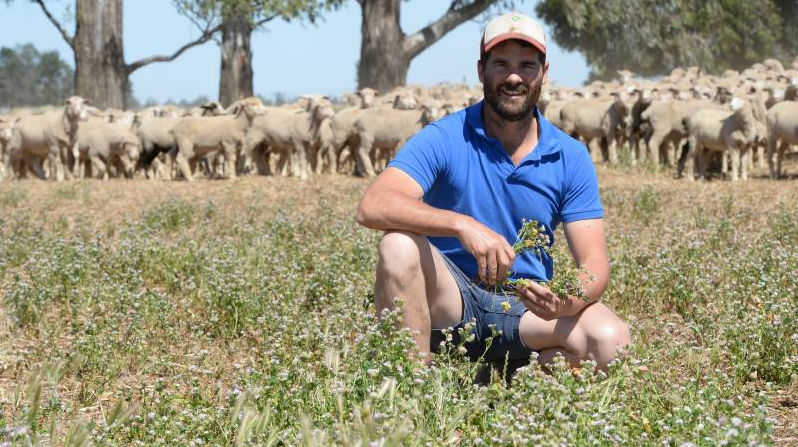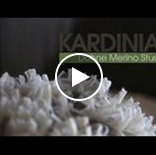Prime lamb flavour over fast growth at “Carnbre”
The Land / Vanessa Binks /3 Jan 2017, 11 a.m
The Andrew’s family began their Dohne prime lamb operation six years ago after deciding the existing Merino base was not reaching the prime lamb market potential.
Jarrod Andrews, “Carnbrae”, Tocumwal, and his parents Jeff and Jenny, run 4000 Dohne ewes on a 1092 hectare property.
When the drought hit in the year 2000, Jarrod Andrews said the family’s mixed cropping operation was under pressure, along with his father’s 500 cross-bred ewe base.
“I came back to the farm in 2001 after I finished school and we didn’t have any water, so we ramped up the Merino ewe numbers and brought in lambs to fatten,” he said.
“About six years ago we brought in our initial mob of first cross Dohne ewes and also a couple of rams from a Corowa stud and built our ewes numbers to breed our own ewe replacements and enter the prime lamb market.’
Based on Kardinia Dohne bloodlines at Corowa, the flock continues to run on these genetics because of the quality multi-purpose strengths.
“Having wool and meat sheep you are getting the best of both worlds – since breeding our own replacement ewes we are maintaining the quality of the Kardinia bloodlines because we are not bringing in outer culled or surplus ewes,” Mr Andrews said.
Separating his ewe flock into two mobs of older and younger ewes, rams from Yaralla Poll Dorset’s at Finley are put over the older ewes to produce progeny for the prime lamb market.
“We do this to keep the Dohne ewe base pure and the Poll Dorset brings in those vital meat traits,” Mr Andrews said.
“The wether lamb portion does very well in most conditions – they get to market a couple of months quicker than a Merino lamb – so we have definitely found we can get them fatter a lot quicker,” he said.
“We chose the Dohne ewe because they are very hardy on any type of country and quick maturing with good maternal traits – that way we can get them into lamb earlier as young lambs.”
The Andrew’s flock consists of the Poll Dorset cross because they are a popular combination in the wider market and produce a proven prime lamb article.
An all year round joining is incorporated at “Carnbrae” to ensure a constant and reliable source of income.
Mr Andrews said with the bills never stopping and not abiding to lambing seasons, a break in lamb production would not be efficient.
The main lambings occur in April, May and August, with progeny also hitting the ground in November.
“We have not got the rams in all year – I scan the ewes and then give the dry ones a second chance – they just get put back in with another mob that has a ram,” Mr Andrews said.
Lambs are weaned onto pasture according to weight at about 20 kgs or four months old, with the ewe lambs retained and the wether portion grown out to 24 kgs dressed weight or 8-10 months old.
Over the hook is the target market for the Andrew’s because of its predictability and the financial return based on the article presented.
“We prefer over the hook because you always get your price and you actually get paid for what you have produced – the sale yard system puts you in the hand of the buyer’s and if they can get a bargain they will – so it’s a bit more of gamble,” Mr Andrews said.
“Our most recent return was more than $6 per kilogram for over the hook in about August this year,” he said.
Believing the prime lamb market is a stable and profitable part any farming enterprise, Mr Andrew said that these factors are what maintain their commitment to the sector.
“When it’s dry and issues present in cropping, at least you always have got the sheep, despite the conditions they are still growing to an extent – plus the prime lamb market is growing – we are seeing more effort to get our lamb over to Asia and America,” he said.
“We are trying to produce a lamb which is quick maturing because we want to attempt to get them off earlier but you have to be careful because there is the trade off between fast growth and eating quality – as producers we can’t forget the end consumer’s needs.
“We are seeing a lot of people looking for fast growth in their rams and as a result they are getting less fat in their lambs – fat is where the flavour is so it’s a fine balance which we do not want to lose.”
Jarrod Andrews, “Carnbrae”, Tocumwal, and his parents Jeff and Jenny, run 4000 Dohne ewes joined to both Poll Dorset and Dohne ram’s.











